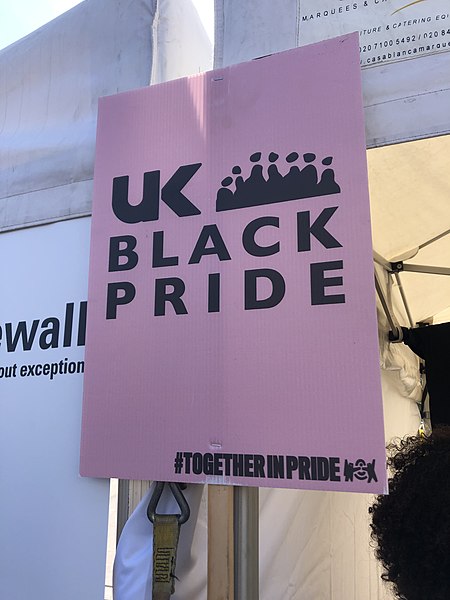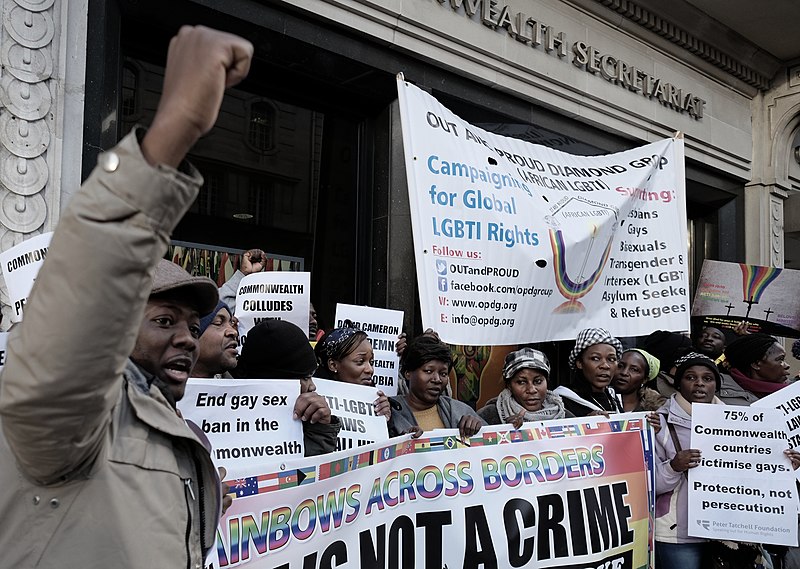Meet Phyllis Opoku-Gyimah, better known as Lady Phyll. Born in Islington, London in 1974, the British political activist’s story is one of determination and unity. Her work throughout the years has brought light to the prejudice against LGBTQ+ individuals of ethnic minorities, and she has worked tirelessly to liberate them.
When asked what molded her into the woman she has become today, Phyll notes that she’s always felt the pressure to stand up for her community, as she said:
“Some of us are born with a nagging, persistent and stubborn feeling that we are part of the solution. And I’m one of those people…I decided to follow my gut and engage with the work, but it often feels bigger than me.”
Undeniably, her dedication to fighting for the rights of others is her vocation. Being so ingrained in these communities herself, Phyll understands first-hand the struggles these discriminated demographics are up against daily.
Struggle Before Success
As a black lesbian woman, Lady Phyll is part of a demographic that faces the brunt of discrimination. Despite how far we have come as a society, racism, sexism, and homophobic views are still rampant amongst certain groups. This affects the lives of so many.
As reported by Stonewall, only 46% (approx.) of the LGBTQ+ community in Britain feel comfortable sharing their or sexuality with their loved ones. This gets worse when race is considered. 51% of the minority ethnic LGBTQ+ community has experienced discrimination from other individuals in the LGBTQ+ community due to their ethnicity. These figures alone highlight how layered discrimination is amongst communities, and these are the battles that Lady Phyll has dedicated her career to fighting against.
Navigating Discrimination in Britain
Lady Phyll’s impact through her activism is nothing short of extraordinary. In 2005, Phyll cofounded and became the executive director of UK Black Pride. Starting off as a day trip to Southend-on-Sea with members of the online network Black Lesbians in the UK. This event now garners nearly 8,000 people annually. And is Europe’s leading celebration of LGBTQ+ people of African, Asian, Middle Eastern, Latin American, and Caribbean heritage.
Lady Phyll also works as the Executive Director of Kaleidoscope Trust. The human rights charity fights for equal rights for those in countries where they are “discriminated against because of their sexual orientation and/or gender identity”. They do this by raising awareness of the stories of LGBTQ+ individuals, and by getting in touch with international policymakers. In a bid to improve LGBTQ+ rights – amongst numerous other things. The work of Kaleidoscope Trust emphasizes the range of ways Lady Phyll actively creates change in any way possible.
 Josiefraser, CC BY-SA 4.0
Josiefraser, CC BY-SA 4.0 No Thankyou
Furthermore, Phyll notably rejected an MBE in 2016 in honour of her cause. In an interview with HuffPost, she explained that she stands by her decision to reject the MBE for a number of reasons. Two key factors that fuelled her choice were the Windrush scandal and the Commonwealth.
“Everything about what the (British) Empire stood for, how it left such a toxic legacy, this is playing out through the Windrush scandal…But also it was about the fact that you do have over 36 countries around the world which may be part of the Commonwealth but still torture, persecute and kill LGBT people.”
Phyll believed it would be a disservice to the communities she represents by accepting the MBE from the very institution that does not support them. However, this has not stunted the recognition of her hard work. Since then, she has won a number of awards for her work, including the Black LGBT Community Award and European Diversity Awards Campaigner of the Year in 2017. She has continuously been noticed for her endless dedication to those communities who have been prejudiced against.
 Alisdare Hickson from Woolwich, United Kingdom, CC BY-SA 2.0
Alisdare Hickson from Woolwich, United Kingdom, CC BY-SA 2.0 Leading by Example
Lady Phyll is a pioneer for black and homosexual activism in the UK. And has taken the steps for others to follow in the fight against discrimination. Phyll herself is carrying the baton of activists before her. Her plight continues the work of people like Marsha P. Johnson who fought for American gay liberation and was a key figure in the 1969 Stonewall uprising. This work done in America has been brought across the pond by people like Phyll. When asked about the work she does, she commented with this:
“In predominantly white countries, it’s easy for us to forget that we are part of the global majority. That we are connected to billions of people across the world whose dreams for and actions toward liberation align with our own”
In essence, Lady Phyll stands for a wider cause that affects so many more people than the Queer, Trans, and Intersex People of Colour (QTIPOC) in the UK. It is a global fight. We too must stand for a cause; however, it is often difficult to do this. But it doesn’t need to be. By simply lending an ear for others to share their story, or even by volunteering to take part in UK Black Pride event. You are contributing to the change we need to be in order for discrimination in Britain to be eradicated.
